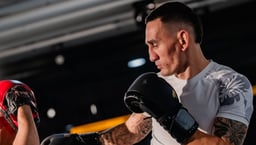
Issue 184
Dana White publicly lamented TUF 17 runner-up Uriah Hall for his lack of killer instinct once his UFC career started proper this summer, just weeks after labeling him as ‘the most feared guy’ ever to appear on the reality show.
During filming of The Ultimate Fighter earlier this year, Hall was knocking people out for fun when the cameras were recording from inside the empty TUF training center. But after first failing in the live finale, when as a huge betting favorite he surrendered the TUF title to far less experienced Kelvin Gastelum, Hall was equally as uncommitted at UFC on Fox in Boston, when he high-fived and hugged his way through three rounds against a game and ultimately victorious John Howard.
“He’s not a fighter… It’s a mental thing," a disappointed White claimed afterwards. "He was this killer on TUF, and then he comes into the big show where it really matters and this is going to make your livelihood and everything else, and he turns into this different person: this super nice guy.
“He was telling me after the Kelvin fight, ‘I really like him, he's a really nice guy.’ OK, well that really nice guy just took everything you wanted. Do you get what I'm saying; does that make sense to you? I guess it doesn't make sense to him."
Being fit for competition is one thing, but being mentally capable of performing when it matters is a chain of sports psychology that’s red hot in the sphere of professional sports.
Everyone who’s ever been a member of a club has known an athlete who excels in training, yet blows it when it truly matters. Some people are able to deal with the pressure of competition, while others should stick to staying fit and perhaps coaching.
What’s clear is mental toughness isn’t a just byproduct of simply being fit and technically equipped to compete. According to Dr Jim Loehr, author of The New Toughness Training for Sports and chairman of the Human Performance Institute in Orlando, Florida, mental toughness is, "the ability to consistently perform towards the upper range of your talent and skill regardless of competitive circumstances."
Another author specializing in this field is Dr Patrick J Cohn, writer of various books into the mental toughness aspect of sport. In his free journal 10 Costly Mental Game Mistakes Athletes Make Before Competition he writes: “Pre-game jitters are a natural part of sports, but pre-game performance anxiety will cause most athletes to tense up and not perform up to their ability.”
Whether Hall is indeed a victim of pre-fight anxiety only he knows, but what is clear is he’s viewing his opponents as friends rather than rivals. His high-five fest with Howard took sportsmanship to a whole new and unnecessary level, and simply made Hall appear not to have the ‘killer instinct’ required to make it as an elite athlete.
All martial artists, regardless of whether they’re in a gi or gloves, are taught to respect their opponents; it’s a prerequisite of the spiritual side of all combat training. But respect is one thing; affording your rival opportunities and supporting their confidence is entirely different.
One thing Hall may actually be suffering from is a fear of failure, after all, you lose a couple of fights in the UFC and you’re gone. But putting too much pressure on oneself can be hugely detrimental, as Dr Cohn explains. “The root causes are complex, but fear of failure usually starts when athletes worry about the potential consequences of failure.”
By worrying about the outcome of a competition rather than focusing on a game plan, an athlete may be directly sabotaging their performance without even knowing it. “Mental preparation is one aspect of performance you have total control over,” Dr Cohn adds. “Do not leave mental preparation to chance or external forces that you can’t control, such as your opponents, the conditioning, environment or level of officiating.
“Once you complete your physical training, you want to enter competition with confidence and focus. Be proactive and take personal responsibility for your mental game or mind-set before every competition.”
With an assurance from White that he will indeed get another chance inside the Octagon, Hall has promised no repeat of his first two outings to date. But with more pressure than ever on his performance he’ll need to produce something special next time and display the mental toughness that he’s been lacking since landing in the UFC.
FIVE TIPS TO MASTERING MENTAL TOUGHNESS
1: FLEXIBILITY
So, things are not going your way. You lost a player from a tackle or your opponent got switched at the last minute. One of the keys to staying mentally strong is the ability to adapt and remain relaxed, without going all defensive. Also, stay open to growth and development: remember, every champion is also a student.
2: STRENGTH
Even when the chips are down finding the inner strength to come through adversity and fight to the end is essential in professional sports. As NFL Hall of Famer Vince Lombardi once said: "Winners never quit, and quitters never win."
3: PREPARATION
Cutting corners is nothing but a fast track to failure. Hours in the gym and honestly in competition are the key to a healthy mind, body and spirit. When you prepare right then you can compete with a clear conscious and 100% confidence.
4: RESILIENCE
Winners lose. It’s how athletes bounce back from any setback that truly makes them a champion. Being able to learn from mistakes, and push forward from a defeat is what separates the good from the great. Likewise, it’s human nature to make a mistake once in a while. Developing thick skin is the prerequisite of any pro athlete.
5: SPORTSMANSHIP
Becoming a cheerleader for your team, or simply masking a heavy blow from an opponent are all forms of sportsmanship that must be mastered to succeed. Never let an opponent know they have you hurt or down, it will only lift their performance. Instead smile at any challenge and always support your team.
...









